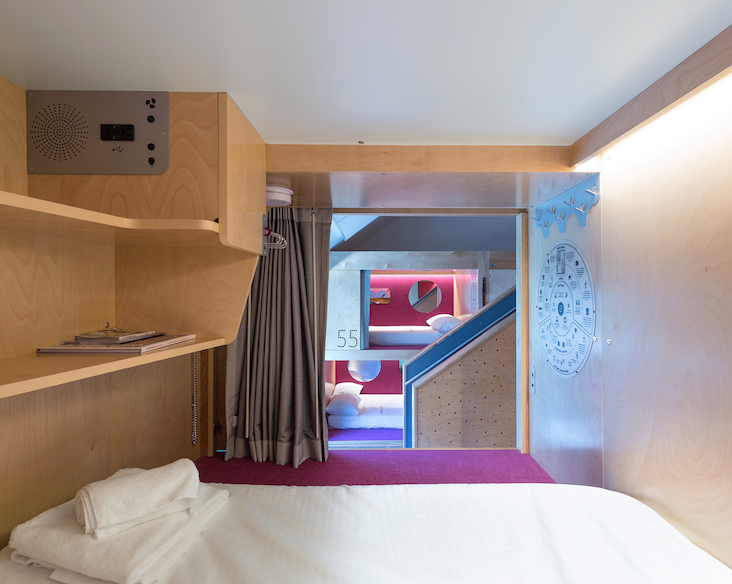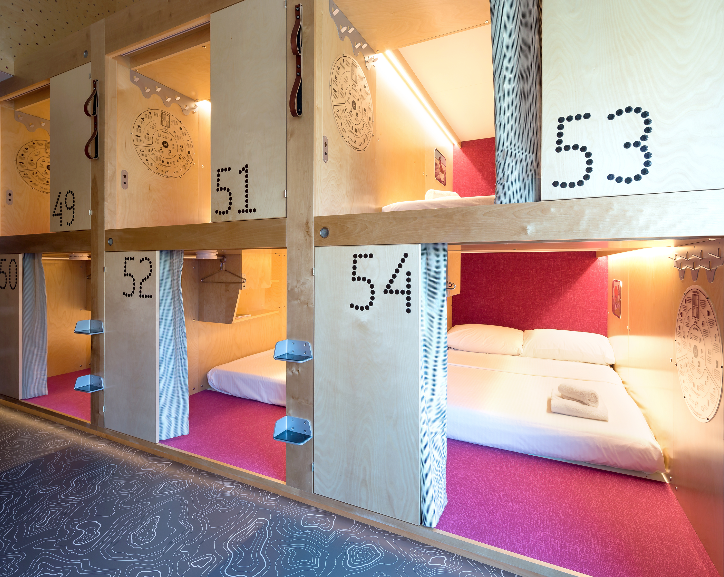At least two pod hotels have emerged in southwestern B.C. in less than a year, and some hotel industry observers say it could mark the start of similar establishments going mainstream throughout North America.
The latest such establishment to enter the B.C. market is Panda Pod, a 64-pod hotel scheduled to open in Richmond by late April.
Pod hotels are overnight accommodations with capsule-like tiny rooms built around a single bed.
Panda Pod general manager Sharon Cheungsaid in a statement that the hotel’s proximity to Vancouver International Airport, and the region’s high hotel room rates, played into the company’s reasoning for entering the market.
“The passenger count at Vancouver International Airport broke through 24 million in 2017 due to the increasing number of new airlines and new flights to and from Asia, as well as U.S.,” Cheung said. “We can see the growing needs in accommodations for worldwide travellers…. We would like to offer a more economical accommodation alternative for the travellers with budget concerns.”

Cheung added that Vancouver’s cosmopolitan population helps Panda Pod’s business case, because familiarity with Asia can mean more familiarity with the pod-hotel concept.
Pod hotels first took off in Japan, which, as of 2016, was home to 78 per cent of the world’s pod hotels.
Analysts say the next big markets are likely to be China and Southeast Asia, where land costs and population densities are similar to Japan’s. But while global analysts tend to look to Asia for the future of capsule hotels, one observer says North America may be ripe for a pod-hotel boom in select urban environments.
Michael Coletta, New York-based manager of research and innovation for travel industry research firm Phocuswright, said competitors have popped up in the last few years in Manhattan, San Francisco and Boston. Their rise has been fuelled by low rates and the minimalist living trend.
But he added that pod hotels also have to make sense economically to their owners and to consumers, and in both cases the hotels’ limited need for land and space could mean big margins for hoteliers running them, even at room rates that can be more than 50 per cent less than at conventional hotels.
“It seems to be taking off in North America already, probably more than what people realize,” Coletta said. “It makes sense in urban areas, as it does in Japan, being able to book a clean room at a cheaper price point.”
Russell Klingco-founded Whistler’s Pangea Pod Hotel last August. The hotel’s business has ebbed and flowed with the ski resort’s tourist seasons, but Kling said Pangea was above 90 per cent booked for a significant portion of the winter ski season and many days were sold out at the 88-unit hotel.
Kling said Pangea is already planning a second location in B.C. while the company contemplates markets elsewhere in North America.
He added pod hotels in North America can’t simply copy and paste the business model from Japan because the overseas market is dominated by business travellers at train stations or airports looking for a convenient, cheap overnight stay.
“In the Japanese pod model, I would bet you the average stay is one day or 1.1 days,” Kling said. “There are very few people who stay multiple nights. Here in Whistler, our average is several nights — in the winter, it’s close to a week. So when you think about the market and what is needed… it is a different target market.
“What you see at the airports can be more similar to the Japanese model, but it’s a very different business to when you want to visit a town. So we’ve slid a little more toward traditional hotels in some areas.”
That’s why Pangea offers amenities like double beds in every pod, high-quality linens and artwork to present a “livable” high-end accommodation.
The hotel separates its bathrooms into more than 60 components to accommodate the 88 rooms so that no one has to wait in line as they do at a typical shared-space accommodation.
“To me, the biggest reminder that you are staying at a hostel is when you have to wait for bathroom facilities,” Kling said, noting that while he launched the Pangea Pod concept after falling in love with hostels (he met his wife, Jelena, while both were travellers staying in hostels), he knew the idea needed to evolve for Whistler.
“‘Hostel’ is a dirty word to some people, which we think is laughable,” he said. “There’s a social element that we want to embrace,” he said. “But at the same time, we want key elements of privacy and high-end design. So I would say our target client is someone who stayed at hostels 10 years ago, people who are young professionals who have graduated from hostels and have disposable income, and they want somewhere nice but where they can also meet others in a cool environment.”
As for the long-term viability of pod hotels in North America, Coletta said demand will persist despite the continued popularity among U.S. consumers of outsized purchases like big SUVs and large houses with open space. He noted there is also a growing counter-trend of young professionals looking for affordable but stylish accommodations, and businesses like pod hotels and pop-up shops reflect that demand.
“I don’t see any major roadblocks as to why it wouldn’t work in most North American urban areas,” he said, noting some pod hotels have started offering offices for business travellers looking for workspace. “In some regards, I guess it will remain somewhat niche. It will remain in areas where it makes the most sense, but I think there are other cases for pods, and it’s up to the creativity of different companies to find those applications.”
Click here for original article.



